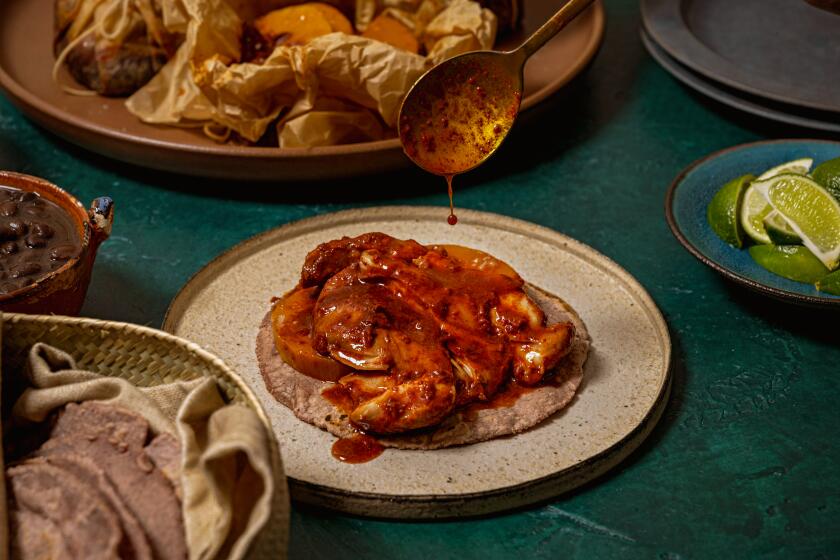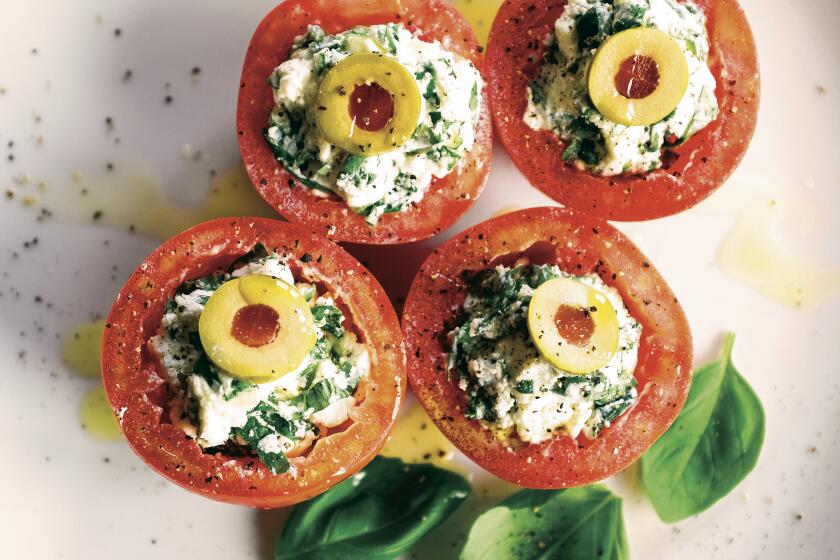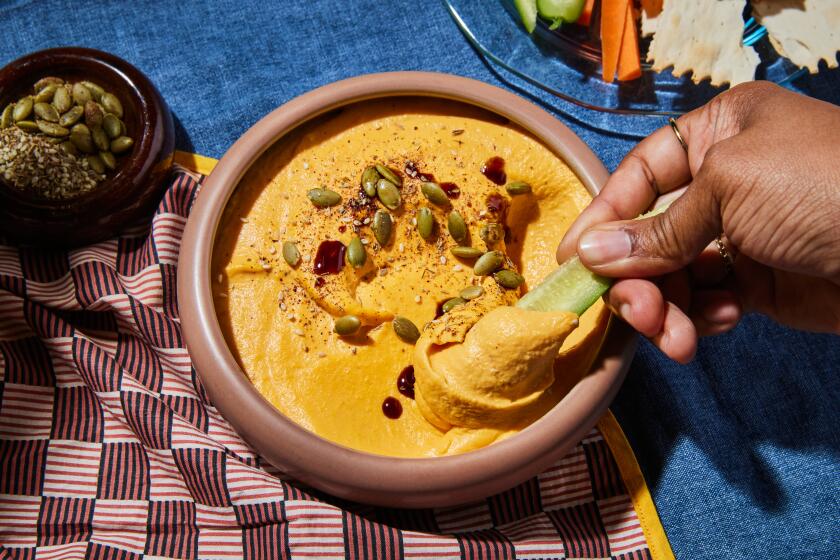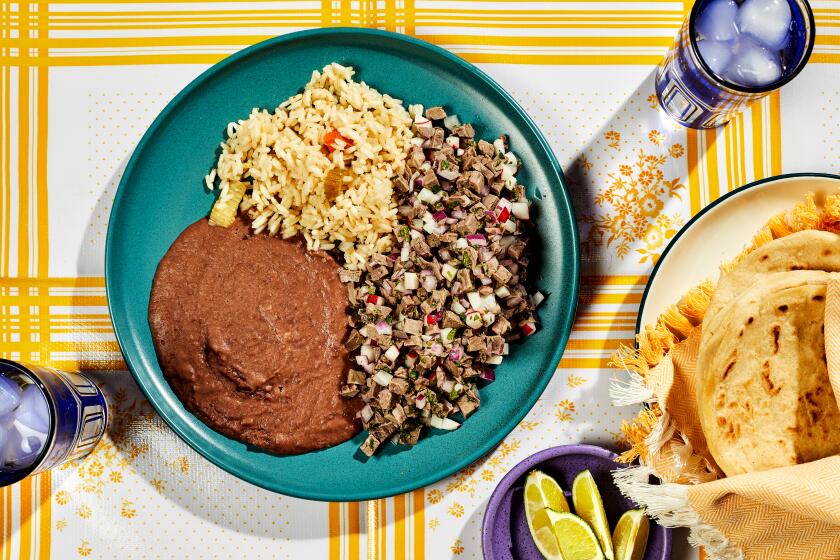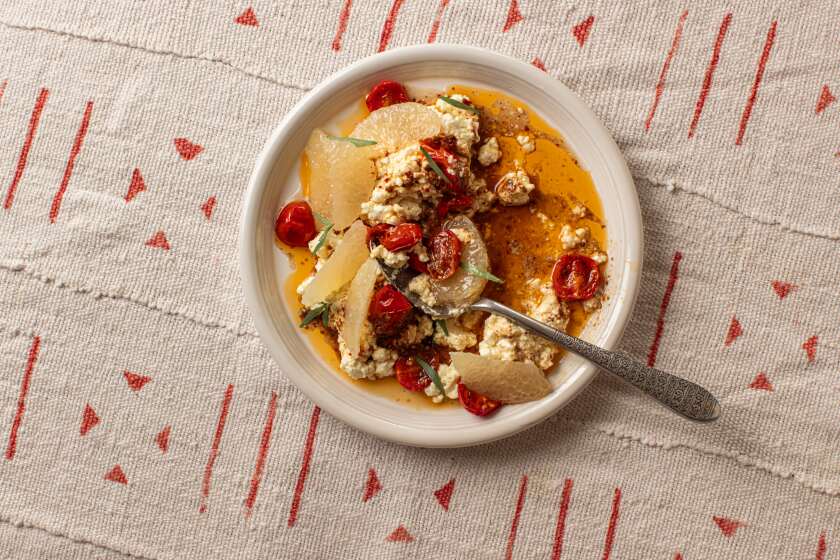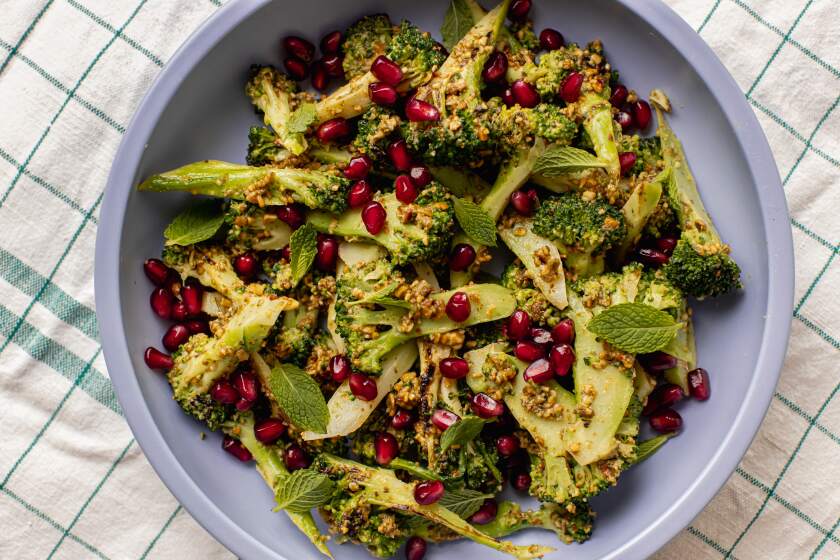Yukon Gold Potato Hash With Broccoli, Capers and Nyons Olives
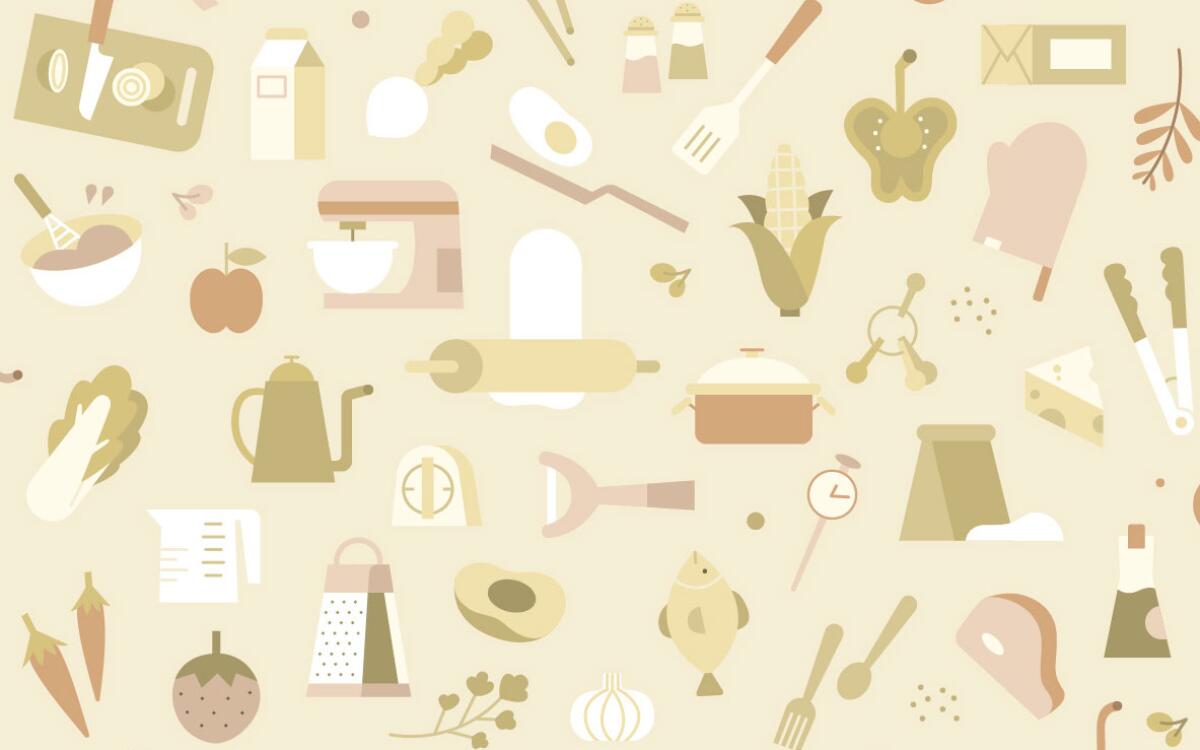
Itâs a January weekend and 80 of us are packed into a plywood-sided farmhouse nestled in the foothills of the Sierra. The great room--scented with citrus, rosemary and lavender from the garden--glows in warm candlelight.
Large platters of winter vegetables grown in the fields nearby and cooked by Los Angeles chefs Evan Kleiman and Suzanne Goin beckon from the sideboard: red and orange Swiss chard baked with bechamel and buttered bread crumbs; arugula, radicchio and red onion salad; sprouting broccoli and Yukon gold potato hash; a cast-iron pot of braised Tuscan kale.
The event is a wild boar dinner at James and Bettina Birchâs organic Flora Bella Farm arranged by the Los Angeles chapter of Slow Food, an international organization dedicated to the preservation of traditional food ways and crop diversity.
Thereâs a hush and then applause as the star of the evening is presented. Regally, almost medievally, the platter of roasted wild boar is laid upon the table with great pomp, its pelt shampooed clean and used as a tablecloth.
After 12 hours of pit-roasting with garlic, rosemary and bay, the meat is falling apart and aromatic. Crisp in places and tender, it tastes earthier, leaner, more complex than pork. Itâs like a rustic Italian take on a Santa Maria pit barbecue.
Boars--technically, male wild pigs--are so common in Central California that many farmers and others consider them pests. âWildlife biologists regard them as vermin, an introduced species detrimental to the native ecosystem,â says Mark Caywood of the California Department of Fish and Game.
Supposedly, wild boar in California got their start when William Randolph Hearst brought 200 true Russian black boar to his San Simeon estate in the 1920s, and those interbred with runaway domestic pigs.
Caywood says that most of the boar in Tulare County, where Three Rivers is, are actually feral domestic animals that reverted to wild characteristics--longer snout, coarser hair, straighter tail, darker, longer legs, leaner hindquarters and males growing tusks. âTruth is,â he says, âyoung sows make better eating.â
Since California doesnât allow the sale of anything taken with a sport fishing or hunting license, most of the wild boar you find on restaurant menus has been farm-raised either in Texas, Asia or Europe. To taste real wild boar, you have to know a hunter.
Although that was the lure that had drawn us--farmers market directors, a construction manager, teachers, a Caltech electrical engineer, the Sequoia National Park archivist and visiting and local farmers--in the end, the point wasnât really the pig at all, but the place.
The Birches started Flora Bella farm, which sits just below Sequoia National Park near the town of Exeter, by digging a well and bringing in electricity 12 years ago. They built the barn and the house and are working on a cold-storage building that Bettina refers to as âJamesâ five-year project.â
The Birches sell most of their organic produce--some grown on leased fields in Exeter and Seville--at Southern California farmers markets and to a few restaurants, such as Lucques and Les Deux Cafe, and--along with Bettinaâs handicrafts--at their own âstoreâ in the barn on Thursdays. They are actively involved in Community-Supported Agriculture, a program developed by small farmers to provide consumers with fresh produce on a weekly basis.
The afternoon started with us meandering about the 26-acre farm. It was one of those fresh, glorious winter days when clouds scud across blue sky and you can smell the trees and earth after the rain.
The artistic touch of Bettina Birch, a landscape designer, was evident: the moody herb-filled âmagicâ garden with its stream, moss-covered boulders and three pet burros, and the rose garden at the front of the house that gives the farm its name.
We nipped into a barn garlanded with citrus-laden branches for a glass of wine and lazed by the bass-stocked pond. Fifteen-year-old Anna Birch offered griddle bread, goat cheese and arugula sandwiches, and bruschetta with three toppings--romesco, a Spanish red pepper-and-nut paste; tapenade, and Flora Bella cranberry bean puree.
But there was no sign of the boar, other than its black-and-tan head and pelt drying in the sun, carefully shampooed by 17-year-old Josh Birch. Family and friends were tight-lipped about exactly who bagged the boar and where. (Only thing worse than wild pigs overrunning your property is uninvited hunters.)
âI didnât sleep for a week, worrying about that boar,â James finally confessed. âThose pigs must have read about this event, because they stayed away. It was Wednesday when my friend found one for me.â
The unnamed friend had shot an approximately 160-pound young boar, not quite enough to feed 80, so another pal pitched in part of a wild pig heâd hunted.
The plan had been to roast the pig in a pit by the house, but this being real life and not the Food Channel, the ground was too cold and wet to dig. So the pig was sent to nearby Exeter, to be slowly roasted in a concrete-lined pit.
But there was still plenty of cooking going on down on the farm. Ensconced in a makeshift outdoor kitchen with views of the pond and snow-clad mountains, Kleiman, of Melrose Avenueâs venerable Angeli Caffe, tended a traditional Umbrian ragu of boar trimmings that was simmering on the two-burner camp stove. It was rich with red wine and tomatoes, and would be served over gnocchi made from Flora Bellaâs own russet potatoes.
âItâs wonderful to experience the full circle all at one time--being in a rustic farm environment and cooking for a sophisticated audience,â said Kleiman, leader of the Los Angeles Slow Food group, as she fed potato peelings to Thumper, the pet pygmy goat.
It was like sleep-away camp for the chefs. Goin, chef of L.A. hot spot Lucques, tended two cast-iron skillets at the small family stove, padding about in her wool slippers. The aroma of roasting potatoes, garlic and herbs filled the house.
âIt feels so good to finally be here on the farm where so much of the food I serve in the restaurant comes from,â she said, as she joked with Josh and munched some of the farmâs sprouting broccoli (which is intensely sweet and tender right now).
âWorking with whatâs in season drives what you make; itâs a structure thatâs bigger than you.â
It was a structure bigger than the boar too. Like Thanksgiving, the side dishes ended up trumping the centerpiece--the farm trumps the hunt.
And as Bettina Birch surveyed all of us crammed into the house her family had built, the message was clear.
âThis is a dream come true,â she said. âWe didnât come looking to be organic farmers, we just wanted out of the city. Being a small farmer is economically painful. Every morning we make the decision again to keep doing this. Seeing you here gives us the energy to go on.â
Heat the oven to 400 degrees.
Scrub the potatoes and toss them with 1 tablespoon of the oil, the garlic, thyme sprigs and bay leaf in a roasting pan. Cover the pan with foil and roast until the potatoes are tender, 50 minutes.
Cut away the broccoli stems where they start to get woody and discard. If the heads are large, cut them into florets. Cook the broccoli in boiling salted water until crisp-tender, about 3 minutes. Drain the broccoli, cool, then cut the spears into 2 or 3 pieces.
Mix the capers, olives and 1 tablespoon olive oil together in a small bowl.
Crumble the cooled potatoes with your hands into 5 or 6 pieces each. Squeeze the roasted garlic out of the skins and set aside.
Heat a large, heavy skillet, preferably cast iron, over medium heat. Add 3 tablespoons of oil, let it get hot, then add the potatoes. Cook the potatoes until theyâre golden brown and crisp in spots, stirring occasionally, about 10 minutes.
Add 1 tablespoon of the oil to the skillet and then add the shallots, broccoli, roasted garlic and thyme leaves and toss together with the potatoes. Cook the hash until the broccoli is hot, the shallots are translucent and the potatoes have begun to break down a bit, 3 to 4 minutes. Stir in the caper-olive mixture, and taste for seasoning, adding salt as needed.
Get our Cooking newsletter.
Your roundup of inspiring recipes and kitchen tricks.
You may occasionally receive promotional content from the Los Angeles Times.










